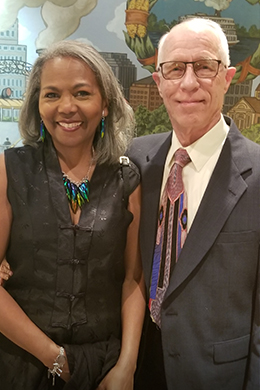Barbara and Roger Blomquist
Barbara Blomquist

Why did you choose Northwestern?
My husband was enrolled in the PhD program in engineering and I was teaching at a local high school. At the end of the school year, I was riffed and I decided to also pursue my doctorate.
How would you describe your research and/or work to a non-academic audience? What was it then and/or what it is now?
I taught at several community colleges and was impressed with mature adult students, especially women with grown children who enrolled in college—sometimes decades after high school. My dissertation delved into how these students made community colleges true "Open Door" institutions.
Tell us who or what inspired your research and/or work.
When my mother had three children she went to school to become a nurse. Later, she wanted to be an English teacher and actually started university the same day I started. It was an inspiration to go to school with my mother.
What are you most proud of in your career to date?
As an actress, I am able to use my teaching experience to reach adults through media. I can "teach" with my voice and acting skills. I relate to adults in business, corporations, offices, and factories and help them see media as not just a boring requirement for their training.
Tell us about a current achievement or something you're working on that excites you.
I am developing an unscripted reality series that focuses on mature adults making career or life-changing decisions. It will focus on adults who are not ready for retirement but excited about the next chapter in their lives.
What advice would you give your younger self or someone considering a similar path?
Get your education but don't allow it to box you in. Get the skills that allow you to be flexible, which can allow you to pursue other goals later in life.
Roger Blomquist
Why did you choose Northwestern?
Although small, the engineering sciences program was a good one, and Northwestern is in a major metropolitan area with high school teaching opportunities for my wife, Barbara (also NU PhD, 1979). I finished my nuclear submarine duty during the fall quarter, and the nuclear engineering group in engineering sciences let me test out of the introductory courses, which I easily did.
How would you describe your research and/or work to a non-academic audience? What was it then and/or what it is now?
Then: I was exploring ways to solve the neutron conservation equation that describes the neutron chain reaction in nuclear reactors more accurately, and in more than two dimensions. Reactor designers need to know where the neutrons are in the reactor and what they are doing to help optimize the design for safety and efficiency. Now: I explore the central aspects of reactor design for new types of small modular reactors.
Tell us who or what inspired your research and/or work.
Duty as a Nuclear Propulsion Officer on a US Navy submarine ('72-'74) left me marveling at the elegance and power of the ship's nuclear systems. While at NU, my advisor, Prof. Elmer Lewis, provided me the opportunity to work on his project.
What are you most proud of in your career to date?
I have worked in reactor physics area since Northwestern, but in several subspecialties, including: understanding the complex nuclear data needed to perform accurate calculations; nuclear criticality safety; global fissionable inventory estimates; and small modular reactors. The most satisfying work was my technical support for the US State Department for the research reactor portion of the Iran nuclear deal.
Tell us about a current achievement or something you're working on that excites you.
Small modular reactors show a lot of promise in overcoming some of the economic hurdles imposed on companies wishing to build large reactors. Exploring innovative concepts is an important step in fleshing out that promise. Exploring Nuclear energy has been the subject of a great deal of criticism, for reasons that are inaccurate. I spend some of my effort in the public sphere educating the public and policy influencers.
What advice would you give your younger self or someone considering a similar path?
Pursue what you enjoy, because it is likely that you will be good at it. Take the hard courses. Set a career goal and pursue it, but keep attuned to other opportunities along the way. I was a physics graduate student when I was drafted in 1970, when I opted into the Navy Nuclear Propulsion Program. That turned out to be a better fit for me than physics, so I transitioned to engineering after active duty.